Use of the death penalty is on the decline globally, with the majority of sentences handed down and carried out by a handful of hardcore holdout countries, Amnesty International said in a report (.pdf) released Tuesday. According to the report, “Death Sentences and Executions 2009,” countries that carried out the most sentences include China, Iran, Iraq, Saudi Arabia and the United States. In some places like China and Sudan, executions are applied extensively as a means to intimidate government opponents. China remains the world leader in carrying out death penalty sentences, executing more individuals that the rest of the world […]
Iran Archive
Free Newsletter

The recent conclusion of a new bilateral strategic arms treaty between the United States and Russia is important for both countries’ security. Yet seen through the prism of nuclear disarmament, it is but a baby step. More substantial progress toward the vision of a world free of nuclear weapons will only come to fruition if a key group of non-nuclear-weapon states help defuse tensions between the nuclear haves and the have-nots. The prime candidates for this job are the states often referred to as middle powers, including Ireland, New Zealand, Germany and Sweden. These nations have a history of activist […]

As the first day of spring swept across the northern half of the globe, Iranians at home and abroad celebrated Nowruz, the Persian New Year. The ancient holiday’s traditions date back centuries, but new customs have started taking hold in more recent times. This year, amid profound internal divisions and growing international tensions, the Official Nowruz Greeting became a new vehicle for mobilization and an occasion to outline strikingly different visions of the past, the present, and the future of Iran. The Nowruz messages offered by Iranian President Mahmoud Ahmadinejad, the country’s two top opposition leaders, and U.S. President Barack […]

Despite genuine efforts at engaging Tehran, such as the Nowruz greetings issued by President Barack Obama this past Saturday and a similar Internet video released the previous year, the Obama administration has proven unable to resolve U.S. differences with the Iranian government over Iran’s nuclear program, regional security issues, or other disputes. Developments thus far do not portend any greater success this year. The decades of hostility and mistrust between Washington and Tehran made any bilateral reconciliation effort inevitably problematic. The unanticipated advent of a powerful mass movement in Iran seeking to change the regime’s policies — and, perhaps, the […]
President Barack Obama addresses the Islamic Republic of Iran in a Nowruz message as he did one year ago. In his address, Obama asks Tehran to tell the international community not what they are against, but rather “what they are for.” This message comes during an impasse in talks between Iran and the international community regarding its nuclear development. Obama says that he is not against nuclear development in Iran, he just wants the process to meet international standards.
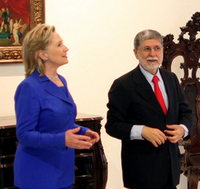
One of the most troubling features of the environment in Washington these days is the inability to make tough strategic choices. This is particularly apparent when foreign policy objectives conflict with domestic political priorities: Because the two policy areas are usually compartmentalized, our diplomats don’t have much leverage to negotiate and bargain with other governments. Secretary of State Hillary Clinton’s recent trip to Brazil, where she unsuccessfully sought to enlist support on the question of Iran sanctions, is a case in point. There are a number of issues currently causing friction in the bilateral U.S.-Brazil relationship. One is our continued […]
If the fuel swap proposal designed to end the standoff over Iran’s nuclear program were a cat, it would be up to its sixth life by now. But Iran has just floated yet another counteroffer: a swap of all of its low-enriched uranium for the fuel cells — fabricated from 20 percent enriched uranium — needed to power its medical reactor. The hitch is that the exchange, as formulated by the head of Iran’s nuclear energy agency, would have to be conducted on Iranian territory and simultaneoulsy. That is, Iran would hold onto its LEU, under IAEA seal and oversight, […]
China’s Southeast Asian neighbors are engaging in a sustained military buildup, with their imports of major conventional weapons systems almost doubling in volume in the five-year period from 2005 to 2009, compared to the 2000-2004 period. Although some of these imports may have replaced obsolete weapons or matched purchases by other Southeast Asian countries, China’s massive military buildup is an important factor driving the region’s defense modernization efforts. According to the latest data released by the Stockholm International Peace Research Institute (SIPRI), imports of major conventional arms by Indonesia rose by 84 percent in the two five-year periods. For Singapore, […]
It’s reassuring to see my biggest concern about a nuclear Iran — the dangers of a regional nuclear arms race — articulated by Brent Scowcroft at the very end of this NY Times article on the potential shift in CW on the issue. The Times piece pivots off a much longer Foreign Affairs article by Ray Tayekh and James Lindsay, which I haven’t had a chance to read in its entirety. Their three containment red lines, which the Times summarizes, seem well thought out: They urge Mr. Obama to prescribe three explicit no-go zones for the Iranians: “no initiation of […]
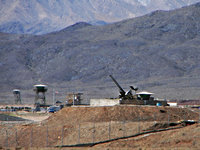
As the United States steps up its campaign to impose economic sanctions on Iran, fears are growing in Washington and in the Middle East that Iran will try to trigger a new war in the region in order to shift attention from its nuclear activities, throw the U.S. and its allies off balance, and put Israel on the defensive. Few people, if any, envision Iran launching a direct attack. Rather, the concern is that Tehran will manage to stir up trouble in Israel, the West Bank, Gaza, Lebanon, or even Syria, in order to spark a new confrontation between Israel […]
As the push for a new round of sanctions against Iran falters, it’s becoming increasingly apparent that the Obama administration’s game plan on Iran policy was long on tactics and short on strategy. We’ve heard a bit about how U.N sanctions are up against a “bad UNSC,” which currently includes Brazil, Turkey and Lebanon as non-permanent members. But that should come as no surprise, and the same goes for those three countries’ predictable resistance to getting vocally on board for stiff sanctions. Now comes word that the administration is trying to carve out an exemption for China in unilateral U.S. […]
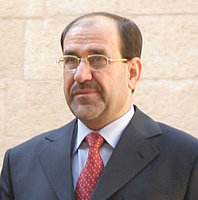
Iraq’s parliamentary elections this Sunday, March 7, will close the first full chapter in the country’s transformation to a democratically elected, majority-rule system of government. The government elected in December 2005 consolidated Shiite rule and eventually brought Iraq a degree of security as Prime Minister Nouri al-Maliki tightened his grip on the levers of power. Now the nation’s corruption, fragile peace and lack of national reconciliation have left many looking for change — including American officials eager to see, if not a new Iraqi leader, at least a shake-up in the composition of his government. They will likely be disappointed. […]
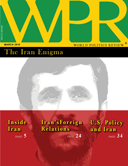
As U.S. policymakers and other governments around the world search for an approach that will convince Iran to stop short of crossing the nuclear weapons threshold, Iran continues to send very mixed signals, and shows no signs of abandoning progress toward producing weapons-grade nuclear material. Meanwhile, Iran is in the midst of an internal political struggle that is often opaque from the outside, but could have major consequences for the country’s position in the region and the world. This World Politics Review special report examines “The Iran Enigma.” This report is a compilation of 25 articles on Iran published in […]
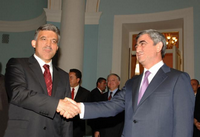
Demonstrating a predictable lack of strategic foresight, the U.S. Congress plans to renew its obsession with the Armenian genocide tomorrow, when the House Committee on Foreign Affairs will hold its mark-up session for the Armenian Genocide resolution. In 2007, the resolution — which “[calls] upon the president to ensure that the foreign policy of the United States reflects appropriate understanding and sensitivity concerning . . . the Armenian Genocide” — passed out of committee but never reached a vote on the House floor, following a strong pushback effort from the Bush administration. The supporters of this year’s iteration hope the […]
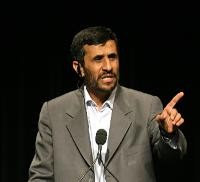
Iranian officials have recently accused the United States of plotting to use a Sunni terrorist group, Jundallah, to overthrow the Islamic Republic of Iran. Though Tehran has made such charges before, this is the first time the Iranian government has explicitly tied the alleged efforts to President Barack Obama. Several reasons explain both the motivations behind Tehran’s accusations as well as their timing. On Feb. 23, the Iranian government reported that it had captured Abdolmalek Rigi, leader of the Jundallah terrorist group. A Kyrgyz airline later confirmed that one of its planes had been intercepted in Iranian air space and […]
Two noteworthy outcomes of Russian President Dmitry Medvedev’s visit to Paris: Russia and France confirmed previous reports that the sale of a Mistral-class vessel now involves four ships, with negotiations now focused on where they will be built. (France wants at least two of the vessels built in its shipyards, and specified that it will deliver them without weapons systems.) And as if by coincidence, Medvedev flirted even further with the idea of new sanctions against Iran. There are three things to keep in mind here. First, despite the bad messaging the sale of the Mistral sends to Eastern Europe, […]
The upcoming Iraqi parliamentary elections loom large in the political fortunes of so many players, both internal and external, that it constitutes a historical referendum of sorts — not just for Iraq, but beyond as well. Across the region, globalization, in all its complex currents, appears poised at a number of inflection points. The outcome of Iraq’s elections will leave winners on some fronts, losers on others, and will trigger plenty of bandwagoning by those worried about being left out or left behind. Here’s a list of some potential outcomes, none of which are mutually exclusive, in rough order of […]
